The abstract:
The article investigates the peach as symbol of the forbidden fruit in Milton’s Paradise Lost, Marvell’s “Garden,” and Eliot’s “Prufrock.” Milton focuses on the fruit’s appearance as “downy,” Marvell refers to the peach as “curious,” and Eliot worries that to “dare” to eat a peach could disturb the universe. Milton’s choice of “downy” fits the peach better than what we would now call an apple. Marvell’s choice of “curious” fits the Christian world’s long-held belief that curiosity was the vice that led Eve to try the forbidden fruit. Eliot’s choice of “dare” fits Eve’s having “dar’d” to eat the forbidden fruit in Paradise Lost, for daring to eat the fruit can disturb the universe, as, for example, Eve’s eating did. These three points are supported by context, analysis, explication, connections, etymology, and more. Noted in passing are a few brief references in art and literature to the peach as the forbidden fruit, and these are treated merely to show that such identification is not unheard of. More important are the connections drawn between the fruit in the three poems, for such connections are the focus of this paper.Please click HERE to view Professor Hodges' announcement.
































